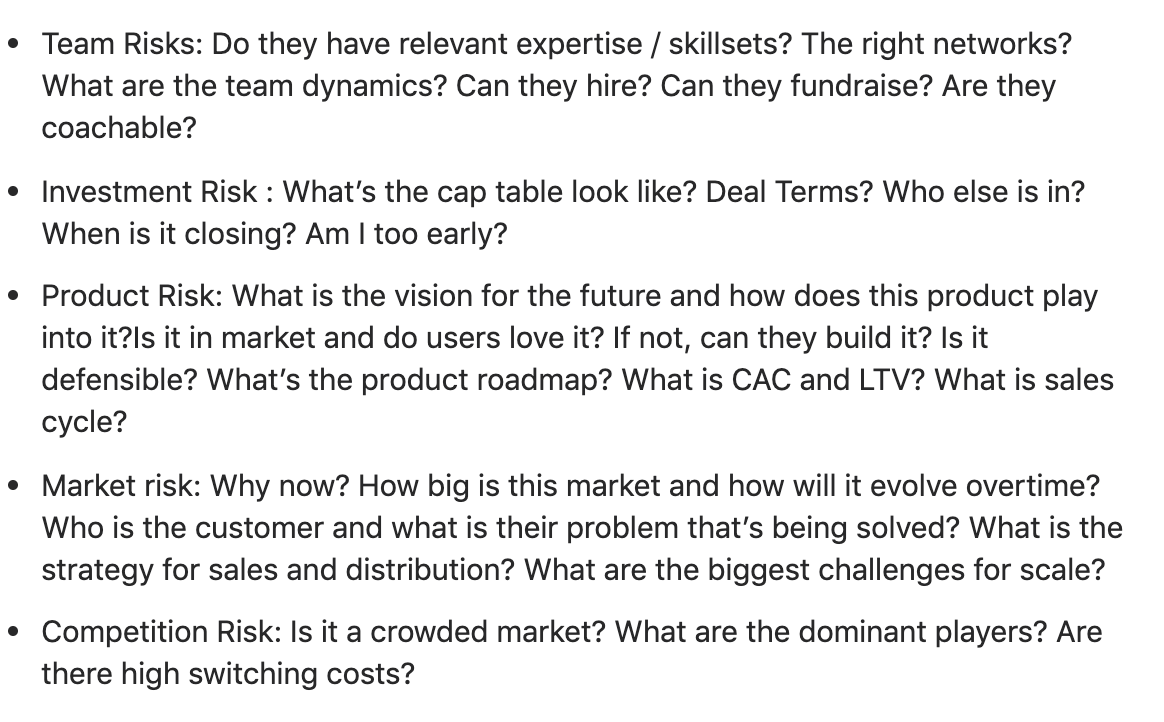Paraphrasing Paul Graham:
Pretend you are a venture capitalist, that you have their incentives in mind, then convince yourself that you'd invest if you were them.
Convince yourself you can convince your partners too.
Consider onion theory of risk: pmarchive.com/guide_to_start…

- What's your unique insight?
- What's your unfair advantage?
- How does this become a $10B biz?
- Unit economics?
- Defensible?
- What is GTM, now and overtime?
- What have you proven so far?
- Biggest risk?
- What will you prove by the A?
Before PM-fit, raise enough to get there
After PM-fit, raise enough fully exploit the opportunity & get to profitability
Enough = More than you think you should, to buy yourself insurance against both internal & external potential bad events
Traction—You have early signals around usage or engagement that indicate a modicum of PM fit
Go-to-market—You know who your customer is, how to reach them, & validated someone is willing to pay.
Fundraise—You know your milestones & how the $ will help you get there
Ask them the question: "What would you need to see to invest?"
Run a tight process to maximize momentum. Do 20-50 meetings in 2-3 weeks all back-to-back. Be 100% focused on raising.
a) introductions from other founders or strong deal sources
b) introductions from existing investors
Bad ways to get investor referrals:
a) introduction from investors who aren’t investing
b) cold outreach
"Out of ten swings at the bat, you get maybe seven strikeouts, two base hits, and if you are lucky, one home run. The base hits and the home runs pay for all the strikeouts."
If you don't want to 10x in 4-6 yrs, don't raise VC!
Tell angels if you want that you can secure their allocation if they commit early (or it's more likely),
Ask VCs at the end exactly how their process works.
If you don’t understand their fund size, deal cadence, talk to their founders, you’re not taking it seriously enough.
You are one of dozens of meetings for them a week. Stand out by doing your homework.
In the beginning perhaps ask "Have you invested in the space before?" to gauge their knowledge.
Midway through the pitch ask "What's interesting to you about this biz? What's unclear?"
It’s helpful to consider the biggest reasons an investor might *not* invest, and pre-emptively address those reasons.
If you’ve solved for them, point to evidence.
If you haven’t, point to how you’ll address them, and the moat you’ve built to date.
"Do you believe there will be a multi-billion dollar co in the space?"
If no —> don’t go further until yes
If yes —> here's our unfair advantage and why now (instead of 5 yrs ago or 5 yrs from now)
"In order to invest, you'd have to believe that we can execute on X, so that we have Y, which will lead to a multi-billion $ biz."
Frame it simply so they can pitch their partners.
IMO it should be closer to 50/50. The more they talk and ask Qs, the closer they are to getting to a yes.
Confident fundraisers listen 50% of the time, ask questions, & admit the risks to investing as well as what they have & haven't proven yet.
If they don’t pitch it well, that may tell you something. Conversely, you may like their phrasing better.
Most likely nearly all investors will say no but you only need one or a few to say yes.
You're going to feel like a total failure at it until someone says yes and then you feel like a huge success.
Money should last to 18-24 months and enable you to reach meaningful milestones
Seed rounds typically result in 15-25% dilution for founders.
Know whether existing investors are following-on, and how much of the round is already spoken for.
"We want to work with the best people, so don't want price to be the reason why that wouldn't happen"
"We're gonna let the market set the price, but it'll be something reasonable, but ultimately we want to pick the best partner."
If this failed, why? (related to biggest risks)
You may want to ask the investor that too:



